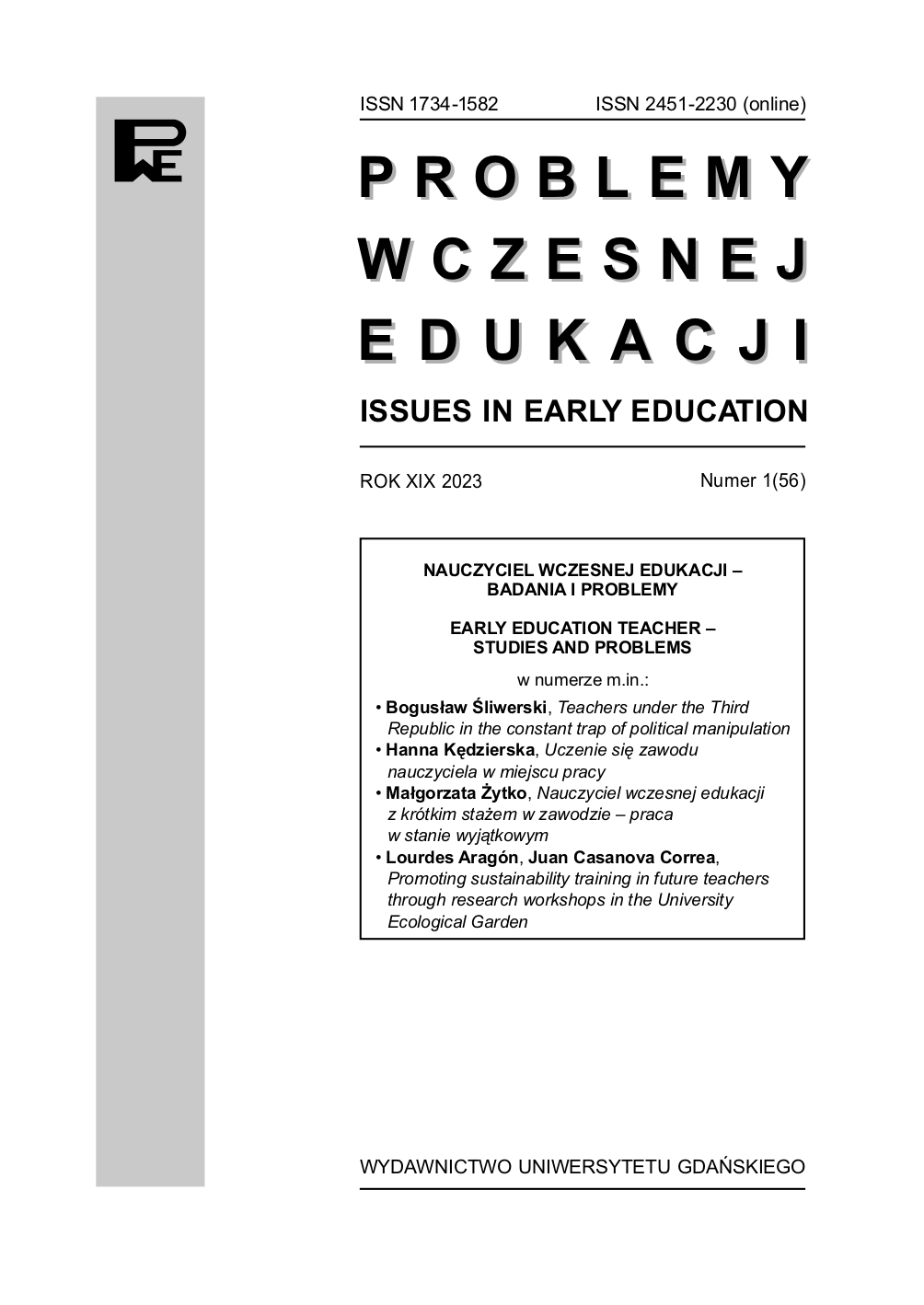Educational changes and barriers to change in the statements of teachers-innovators and non-innovators
DOI:
https://doi.org/10.26881/pwe.2023.56.07Słowa kluczowe:
barriers to change, innovators, teachers, educational changeAbstrakt
The aim of the article is to present the differences in the way of thinking about educational change and its barriers between teachers-innovators and non-innovators. The former understood the concept of educational change in a more radical and profound way. In their statements, they demanded a breakthrough that was, in fact, a questioning of the dominant education model. Non-innovators would like transformations, but more moderate, minor ones that do not go beyond the area of the dominant model of education but can potentially facilitate or make the time spent by teachers and students at school easier or more enjoyable. Teachers-innovators more often focused on bottom-up sources of change, i.e., primarily on teachers and their students. Non-innovators focused rather on top-down sources of change, locating them in particular in state authorities, experts, and politicians, and the role of the market as an institution (in the sociological sense). Both groups also differed in terms of the barriers to change they mentioned. While the former mainly emphasized the importance of what hinders or prevents changes and is dependent on the teacher, the latter emphasized the role of issues independent of teachers. In order to explain the differences between the two groups of teachers, the article refers to the theories of W. Reckless and J.B. Rotter.
Downloads
Bibliografia
Atroszko B. (2022), Znaczenia nadawane przez nauczycieli barierom zmiany dominującego modelu kształcenia (Significance Attributed by Teachers to Barriers to Change in the Dominant Education Model). Niepublikowana rozprawa doktorska. Uniwersytet Gdański, Wydział Nauk Społecznych, Gdańsk.
Chojnacki W.I. (1815), Zasady piérwiástkowé pedagogiki i metodyki: dziéło mogącé służyć dla trudniących się edukacyią publiczną i prywatną elementarną. Warszawa, w drukarni Wiktora Dąbrowskiego.
Dylak S. (2000), Nauczycielskie ideologie pedagogiczne a kształcenie nauczycieli. In: K. Kruszewski (red.), Pedagogika w pokoju nauczycielskim. Warszawa, Wydawnictwa Szkolne i Pedagogiczne.
Fullan M. (2016), The new meaning of educational change. New York, Teachers College Press.
Jordan H. (1891), O zabawach młodzieży. Odczyt prof. Dr Henryka Jordana wygłoszony we Lwowie w sali “Sokoła”, dnia 4 stycznia 1891 roku, “Przewodnik Higijeniczny. Organ Towarzystwa Opieki Zdrowia”, 2.
Klus-Stańska D. (2002), Kultura dydaktyczna szkoły i bariery jej zmiany. “Szkice Humanistyczne”, 3–4(3).
Klus-Stańska D. (2011), Dlaczego szkolna kultura dydaktyczna się nie zmienia. “Studia Pedagogiczne”, 14.
Klus-Stańska D. (2016), Jak wyjść poza horyzont pomyślenia szkoły i zrehabilitować wiedzę? Pod pretekstem reminiscencji z Autorskiej Szkoły Podstawowej “Żak”. “Studia i Badania Naukowe. Pedagogika”, 10(1).
Klus-Stańska D., Nowicka M. (2005), Sensy i bezsensy edukacji wczesnoszkolnej. Warszawa, Wydawnictwa Szkolne i Pedagogiczne.
Kwaśnica R. (2015), O szkole poza kulturową oczywistością. Wprowadzenie do rozmowy. “Teraźniejszość – Człowiek – Edukacja”, 71(18).
Kwieciński Z. (2011), Dylematy, inicjatywy, przebudzenia: nad przesłankami odrodzenia edukacji w Polsce. Wrocław, Wydawnictwo Naukowe Dolnośląskiej Szkoły Wyższej.
Muchacka-Cymerman A., Tomaszek K. (2017), Syndrom wypalenia w zawodzie nauczyciela i w roli ucznia. Przegląd literaturowy. “Forum Oświatowe”, 58(29).
Pechnik A. (1900), W sprawie reformy szkół średnich. Tarnów, nakładem Redakcyi Dwutygodnika katechetycznego i duszpasterskiego, drukiem Józefa Styrny w Tarnowie.
Reckless W.C. (2011), A new theory of delinquency and crime. In: J.H. Rankin, L.E. Wells (eds.), Social control and self-control theories of crime and deviance. London–New York, Routledge, Taylor & Francis Group.
Riesman D., Glazer N., Denney R. (1996), Samotny tłum. Warszawa, Warszawskie Wydawnictwo Literackie MUZA.
Rotter J.B. (1966), Generalized expectancies for internal versus external control of reinforcement. “Psychological Monographs: General and Applied”, 80(1).
Śliwerski B. (2008a), Edukacja autorska. Kraków, Oficyna Wydawnicza “Impuls”.
Śliwerski B. (2008b), Jak zmieniać szkołę. Studia z polityki oświatowej i pedagogiki porównawczej. Kraków, Oficyna Wydawnicza “Impuls”.
Śliwerski B. (2009), O wymierności pracy nauczyciela. “Studia Pedagogiczne. Problemy Społeczne, Edukacyjne i Artystyczne”, 18.
Zarzecki L. (1920), Dydaktyka ogólna czyli kształcenia charakteru przez nauczanie. Lwów–Warszawa, Książnica Polska Towarzystwa Nauczycieli Szkół Wyższych.

 Uniwersyteckie Czasopisma Naukowe
Uniwersyteckie Czasopisma Naukowe





